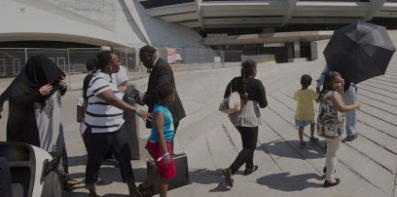August 4, 2017
This has already been a big year for asylum-seekers crossing into Canada from the U.S. But the most recent surge into Quebec, many of whom are Haitians who formerly lived in the U.S., is on an even larger scale and is bound to put greater pressure on the already-strained federal system sorting through their claims.
The trend is driven to a great extent by growing fear among the community that President Donald Trump’s administration will begin deporting them next year—ending a policy, put in place by the former Barack Obama administration after the devastating earthquake in Haiti in 2010, which has allowed more than 50,000 of them to stay in the U.S. Those crossing the border into Quebec are being temporarily housed in Montreal’s Olympic Stadium.
Here are four key questions about the emerging challenges, and at least partial answers.
How big is the current Quebec influx compared to normal flows of asylum-seekers?
Quebec government officials say the number of migrants crossing the border near Saint-Bernard-de-Lacolle, Que., every day has climbed to at least 150 over the past two weeks, up from perhaps a third that many daily crossings earlier this year. Most are Haitian. As a point of comparison, in all of 2016, the federal Immigration and Refugee Board (IRB) completed decision-making on a total of 412 refugee claims from Haitians. Another way to grasp this week’s Quebec numbers: at a rate of 150 a day, as many new migrants will walk into Quebec in five days as have arrived so far all year in Manitoba, another Canadian hot-spot for illegal border-crossing. (As of this week, about 750 asylum seekers had arrived in Manitoba from the U.S. in 2017, according to Rita Chahal, executive director of the Manitoba Interfaith Immigration Council, a key service-provider to refugees.)
What are the chances of those Haitian asylum-seekers having their refugee claims accepted?
Of the 412 claims from Haitians decided on by the IRB in 2016, only 207 were accepted, while 197 were rejected, and eight were dropped one way or another. (Decisions for another 351 claims from Haitians were pending at the end of 2016.) And last year’s roughly 50 per cent acceptance rate for Haitians seeking to stay in Canada as refugees actually looks high, compared to the 35 per cent who were successful in the first quarter of 2017, or the 40 per cent accepted in 2015. In other words, recent history suggests half or more of those Haitians now arriving in Montréal ultimately will not be approved to stay in Canada.
Is the federal government doing anything to speed up the processing of these claims?
So far, new measures taken by Justin Trudeau’s government have not focused on asylum-seekers from countries like Haiti. Instead, the emphasis has been on would-be refugees from countries where political persecution is blatantly prevalent, especially in the Middle East, Central Asia and Africa. For instance, this spring an IRB “expedited process,” which had already sped up acceptance of some refugee claims from countries like Iraq and Syria, was expanded to cover more conflict-engulfed countries, including Afghanistan and Yemen. But that process, which means hearings don’t always have to be held before claims are accepted, isn’t available for Haitians, who generally face a harder time proving to the IRB that they are at risk of being persecuted back home.
What is the process for assessing the refugee claims of those who arrives in Canada seeking asylum?
Every refugee protection claim is decided by a member of the IRB’s refugee protection division, generally after a hearing that can last a half day, a full day, or even stretch over several days. The individuals must demonstrate that they face persecution in their home country. There’s also a shorter process, introduced earlier this year, with hearings lasting perhaps two hours, for claims the IRB deems to be straightforward. An IRB official pointed out, however, that being shunted over into the shorter process isn’t necessarily good news for an individual seeking to start a new life in Canada—it can mean that officials regard the claim as straightforward in the sense that it will probably be rejected.
____________________________________________
